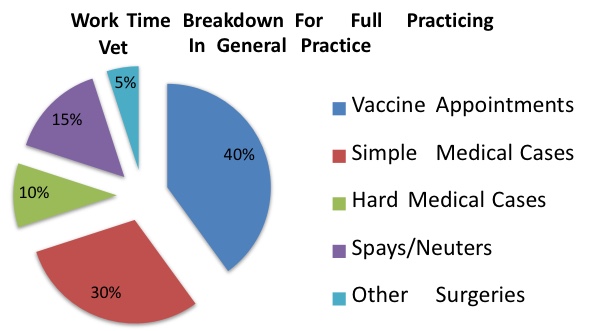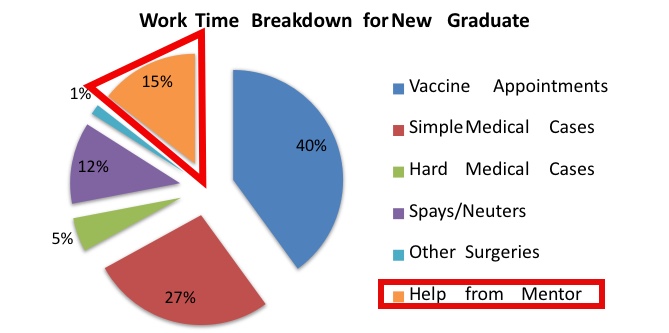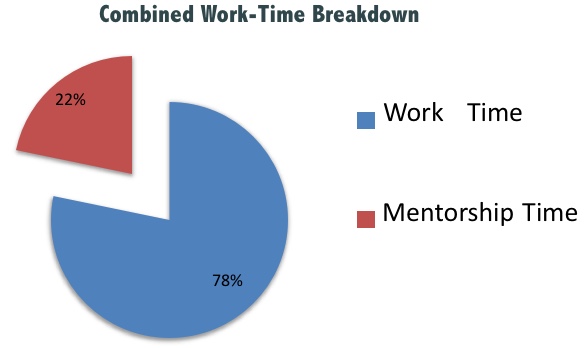Introduction
As a new grad you are likely unsure what a proper wage should be. You won’t want to be greedy, but you also don’t want to be undervalued.
Your ideas of an appropriate wage will come from what you are told in school, agencies, industry standards gathered from websites such as PayScale, Indeed or nationally mandated minimums. Otherwise you might just wait to see what you are offered, or may chat with colleagues.
Usually there will be a giant range in these numbers, which is unhelpful when you have no frame of reference of where you fall in this range.
Balancing your lack of skills and experience with a fair salary can be difficult. KICK ASS VETS will help you navigate this tricky time!
KICK ASS VETS is going to provide a mathematical breakdown to help you hone in on where you should start your salary negotiations. This will take into account both what you are worth to the clinic and also what you are worth in relation to the market.
IMPORTANT NOTE:
KICK ASS VETS is will be talking about what you SHOULD be paid, because until we start talking about appropriate compensation, and ADVOCATING FOR OURSELVES from the ‘ground up’, the industry will not change!
With this blog, we will look at 2 different ways of approximating a fair starting salary for new grads as a percentage of a full-time experienced veterinarian. In the blog
'Evaluate Your Worth: Experienced Veterinarian' we look at how to approximate what a full time veterinarian SHOULD be making.
Method 1: Skill/Competency Comparison
There are many different skills and qualities that make you a valuable vet. How competent you are in these skills and qualities, will make you more or less valuable.
Think critically, and evaluate yourself in the following areas:
Technical Skills (surgical, procedural, animal handling, etc.)
Knowledge
Decision Making Processes
Confidence
Speed
Communication
Mentorship Ability
Give yourself a score /10 for each category. 1 = random person on the street, and 10 = vet with ~5 years experience working independently full time.
IMPORTANT NOTE:
Be realistic, but also do not undervalue yourself. Keep in mind, some of these qualities will take time to master (speed for example, takes time, and rushing surgeries or case management can lead to mistakes). You will not be a 10/10 in each category as a new grad.
This will give you a starting idea as to how you compare to a ‘full time’ vet. You then take your score as a percent, and this is the percent of a full time salary that you should use to guide your negotiations.
Example:
You evaluate yourself as a 7/10 for Technical Skills, 8/10 for Knowledge, 6/10 for Decision Making, 5/10 for Confidence, 6/10 for Speed, 6/10 for Communication and 4/10 for Mentorship Ability:
= 7/10, 8/10, 6/10, 5/10, 6/10, 6/10, 4/10
= 42/70
= 60%
This means you should be paid approximately 60% of what a full time vet should be making that works independently. The other reason to evaluate this list is to pinpoint your weakness. By recognizing and awknowledging your weaknesses you can start improving on these skills/qualities prior to graduation, thus increasing your worth as a new graduate.
IMPORTANT NOTE:
Once you hit 3 months, 6 months, and 1 year re-evaluate this list, get a new score, and assess what your salary should be, and ASK FOR IT!
Method 2: Work-Time Breakdown
As a full time vet, your daily cases will be broken down into approximately the following:
Breakdown of work-day for a full-time practicing general practice veterinarian. A full time vet with experience will be able to perform ~100% of these cases on their own.
IMPORTANT NOTE:
You will always have some cases that you want to run by colleagues, but as a ‘full time vet’, you will be helping others with cases as often as you are being helped with cases.
As a new grad, you will require help and mentorship. Your first month will be intensive, but by about 6 months you will likely be working for the most part, independently.
On average, over the six months, you will likely be doing about 100% of Vaccines Appointments on your own, 90% of Simple Medical Cases, 50% of Hard Medical Cases, 80% of Spays/Neuters, and about 30% of Other Surgeries.
Average abilities of a new graduate to perform various duties. Approximately 15% of your day will be being mentored.
In this scenario, a new graduate on average over the first 6 months, would be able to do ~85.5% of work independently, with help needed in irregular spays / neuters and simple medical cases. Significant help will be needed with harder medical cases and surgeries. This means 14.5% of the time is being mentored.
But we're not done...
Mentorship takes time. On average, teaching takes approximately double the time it would take for your mentor to just do the task themselves. So, for the ~14.5% of your day's productivity lost through being mentored, ~29% of your mentor's productivity is now lost teaching. To put this into context, in the time it takes you to do one spay, it's not a stretch to believe they could have accomplished two.
Breakdown of you and your boss' work-time. Your boss will take double the time out of their day to teach you, so 29% of their day is spent teaching you, while 14% of your day is being mentored.
Looking at the total working time between you and your boss as a percentage:
85.5% + 71% = 156.5%
156.5%/200%= 78%
Combined breakdown of you and your boss' work-time. So overall, about 22% of the work-time day is spent teaching, and 78% of the day is working.
This means, you are worth 78% of a full time working vet…BUT… there is one more factor…..
Speed. Whether or not we like it, Veterinary Medicine is a business, and a business requires through-put to make money and succeed. And since you will be SLOW as a new graduate, you will see less consults, and perform less surgeries than a full time working vet.
As a new graduate you will be SLOW. This is expected, but it does decrease your financial value to your employer and will therefore result in a lower starting salary.
Let’s say you see 3 consults an hour instead of 4, this is working at 75% speed.
75% * 78% = 58.5%
Once you speed up and are doing more consults on your own, OR if you are in a clinic where you aren’t being mentored at all, you need to re-negotiate your salary.
This means you should be paid approximately 58.5% of what a full time vet should be making that works independently.
IMPORTANT NOTE:
Remember, once you hit 6 months, re-evaluate your skills, speed, etc. and re-negotiate your salary!
Summary
No matter how you look at the situation, as a new grad, you won’t be ‘worth’ as much to a clinic as a full time, experienced vet that is comfortable with sole charge. Consider the first couple years of your practice as an ‘apprenticeship’. Based on the approaches above, on average, a new Graduate should be making ~ 60% of a full-time experienced veterinarian to start. (See
'Evaluate Your Worth: Experienced Veterinarian' for an approximation of a full time vet salary).
This comes with the trade-off for the clinic however, as they need to compensate this lower salary with MENTORSHIP and SUPPORT! If you are working sole-charge at a clinic, full appointments booked, no one supporting you, then you are doing the job of a full time vet, and SHOULD be compensated appropriately.
This also comes with the caveat that not all new grads are equal. Some of you have been nurses for years prior to vet school, your technical skills WILL be better than someone that has never held an animal before. Your previous experience SHOULD be compensated and this will be reflected in how you ‘score’ yourself above. Some of you will be great communicators and great at working independently, and some of you won’t be.
Be critically aware of your skills and competencies and fight for compensation! Also, it is very important to re-evaluate your skill and competencies frequently, and have pay reviews and adjustments to reflect your improving working level!
Let's Get Personal
When I graduated my personal perception of myself was that I had better technical skills than the average due to my experience working at an emergency clinic before/during vet school, as well as great communication skills from working as a waitress and a 'go with the flow' attitude from travelling. My knowledge, decision making skills, and other abilities were on par with the average.
The job that I ended up taking involved being on-call 50% of the year, and I negotiated a starting salary about $7000 higher than the average starting salary, along with an extra week of vacation. I also discussed and negotiated a call-out fee for any cases seen.
This seemed good at the time, however very quickly my boss realized that I could 'hold down the fort' on my own and he stopped showing up for work, leaving me sole-charge doing double appointments. This is a common story, so don't be surprised when it happens to you!
I should have re-negotiated after 3 or 6 months, as I was working without mentorship and working equivalent to a full time experienced vet. Also, for the amount that I was on-call, I should have negotiated more. However, at the time I felt great that I had negotiated well, and got a package valued about $8500 more than the average starting salary. The moral of this story is that negotiating not only will get you a more appropriate salary (and likely still lower than you deserve, so don't worry about being 'greedy'), but it will boost your confidence. Knowing that you took matters into your own hands to get what you deserve, and starting off your job with a 'I am valuable' attitude, is a great way to start a career!
Written by Dr. Ann Herbst BSc, DVM
Published July 25th, 2019
Advocate for yourself, you are the only one that will!
Most Recent Blogs
KICK ASS Boundaries for Locums
Locuming can leave you just as stressed and exhausted as full-time work, if you don't set the right boundaries!
Imposter Syndrome
Chances are you will experience Imposter Syndrome in your career, so tackle it head on!
KICK ASS Confidence
Confidence is knowing that you cannot know everything, and new/recent graduates need to know this!









